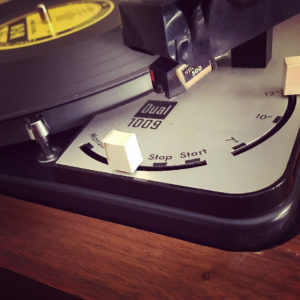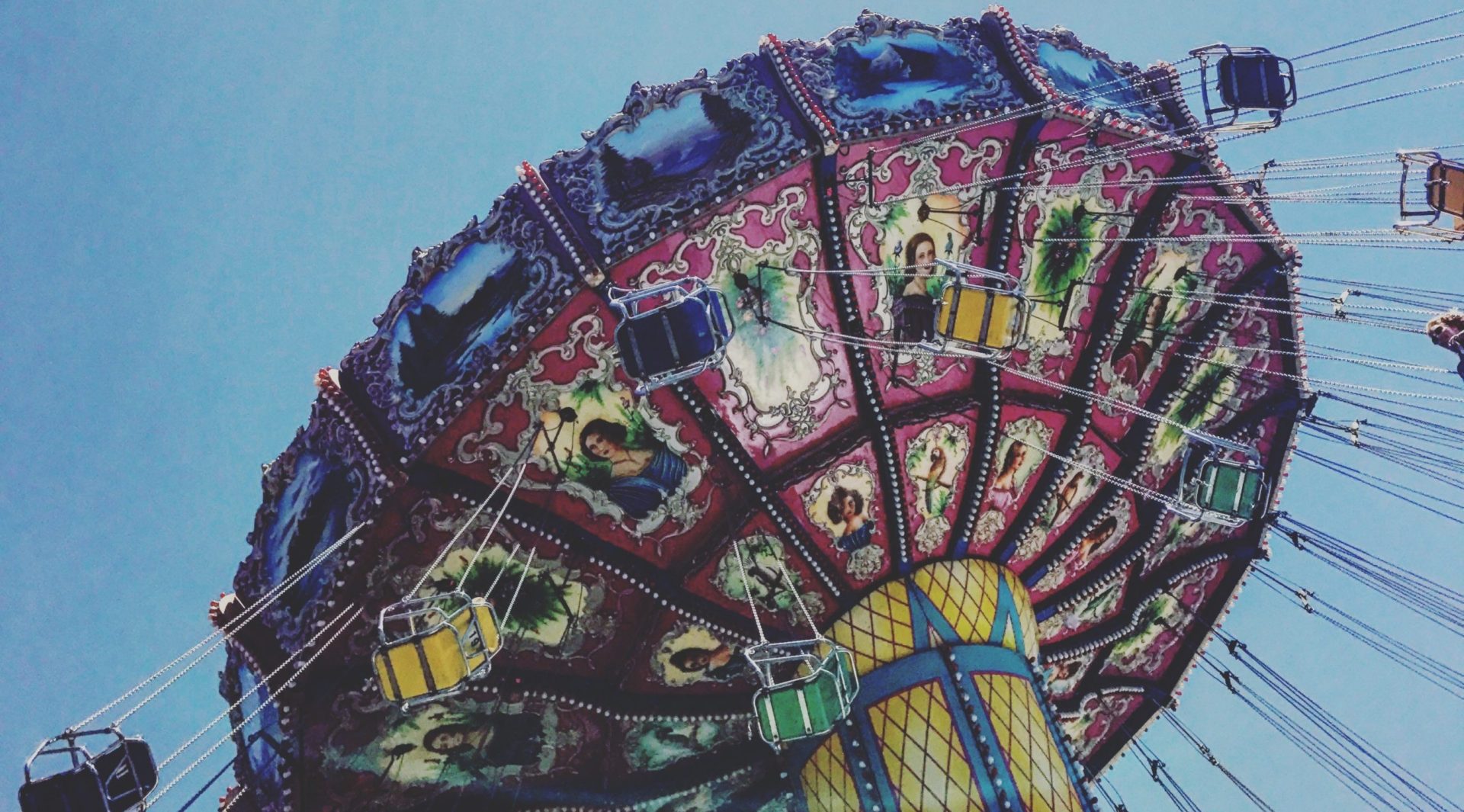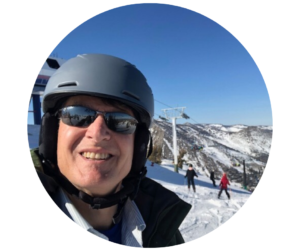Some of us aneurysm and AVM survivors are challenged by brevity, but I’ll try my best to tell my story that way. Surviving an AVM requires a bit of luck and many skilled medical professionals. Without a doubt, we survivors are all here because of both.
When I was a young man, I thought of myself as fairly independent, a community of one so to speak. I grew up and assembled my crew over the years–friends, my dear wife, my two children and always, my sisters, formed my inner circle. My life and work were rolling along as I had dreamed. But one morning, while working away from home, fate revealed that I had never been a community of one. Rather it was me and an undiscovered, 50-year-old Arteriovenous Malformation (AVM) which gave me the gift of the worst headache of my life, announcing that, One Way or Another, it was time to go.
I saw two options: Plan A, drive home to San Francisco (6 hours away) or Plan B, call 911. I picked B.
Luck? Check!
My personal point of view ends here, as I crawled toward the front door of the house where I’d been staying. I was told I was conscious and communicative when the paramedics arrived and found me in the hallway. Those next crucial hours and the days that followed are all hearsay to me. I learned that a new community formed quickly, one that has remained in my heart ever since.
Skilled Medical Professionals? Check!
Maybe we survivors all reluctantly go through a community reboot and reset. After all, brain surgery feels like the most invasive surgery imaginable, a truly unfortunate event followed by a most fortunate survival. We each have our different paths through it, and this is how I’ve tracked mine. First of all, I woke up in a new, forever self-defining state. I had joined a community I’d never heard of before, the survivors of aneurysms and AVMs. I’d sustained just one AVM, but many others have had to battle several of these time bombs. What’s tricky for both caregivers and survivors is that every single patient and brain has its own unique new deficits to uncover and recover from, all different like snowflakes.
To get beyond just surviving, we need both strength and community. It’s so much harder alone. I am very fortunate. I have my wife and kids, my wife’s family, three sisters, my nieces and nephews, and a closely knit extended family. I have many friends from primary and high school, college friends, and connections made from over 25 years in my profession. Who was the first to respond in my time of need? My wife then my best friend. She called him, and he drove right to the hospital while she flew into town. As my awareness of my situation grew, their immediate presence emphasized the severity of my event, but it also provided great comfort.
I’m incredibly fortunate to have this huge, close family who mostly live back east. Two sisters joined my “first responders” of the family kind. One sister supported the hospital bedside scene and all it’s elements with my wife. This balance of wife and sister was very reassuring to me. My other sister later joined my mother-in-law who was covering my two teenage daughters (a HUGE part of my community). What a horrible, shocking, and upsetting turn of events that day was for them. My mother-in-law and sister anchored my Team Daughters, who showed great courage and strength, and I knew they were in great hands.
Of course, there was community of the hospital kind too. As the COVID-19 crisis has shown, those who’ve never needed hospital care are learning that these professional guardians of our injured bodies take on a constant flow of strangers, whom they care for and repair in Herculean fashion with their skills, minds and hearts. It’s easy to overlook their mind and heart work because their skill set alone is certainly worthy of a jaw drop, and a mic drop.

As far as my work community? My job doesn’t require the high-risk precision of an air traffic controller, but my bosses do expect maximum multi-tasking skills from all members of their management teams. Since I did not immediately grasp how lucky I would be in both my circumstances and recovery, mum was the word regarding my “Emergency Hospitalization and Rehab” journey. We did let a few of my closest work friends in on my event. They responded as good friends do, with care and compassion.
The Healthcare Community was great but I couldn’t wait to return to my Status Quo. It became a personal race to Get Back on my feet again and rid my family of that worried look they couldn’t hide. I wanted to show them I could manage the world and my responsibilities as I had before the unplanned rupture and brain bleed that followed. Did my previous Status Quo-ville still exist? Nope. It took some time to realize, but there’s no denying this fact of post-AVM life. Yes, things had changed, and it wasn’t just my community. Tougher to accept, I had changed too. I looked the same, but I wasn’t. I had a blind spot in my upper left field of vision–something not to share with any softball or ping–pong opponents. Other less easy to define changes, like shadows, began to reveal themselves as I healed. Listening closely to music and lyrics had always been a relaxing hobby for me. What I noticed while in intensive care was that I would associate each new caregiver instantly as I met them with a song, as if it was their theme song. A nurse named Angel, became Angel Dance and a nurse named Courtney became Court and Spark. I certainly had my own theme songs for healing too: Don’t Worry Baby, Feelin’ Stronger Every Day, With a Little Help From My Friends, I’m Still Standing…and that’s just the tip of the iceberg. But this instant song association and of labeling people and activities was new. When I got home to my post-AVM World, I sometimes felt like a walking jukebox. Every Little Thing reminded me of a song title. I felt Born To Run and had to Keep On Truckin’. This peculiar experience was More Than A Feeling, but was this a common byproduct of a ruptured AVM?
I had never even heard of an AVM and certainly didn’t know anyone who’d survived one. Then, a hidden gift, a new community was exposed. Yes, a friend had a friend who’d survived an AVM, and she told me about a group of AVM and aneurysm survivors in San Francisco. I finally went to my first TAAF meeting a year after going it alone.
I don’t think I can ever properly describe the feeling of that first meeting, sitting in a room full of strangers who all seemed to know each other really well. We first revisited each other’s stories. This guy experienced a horrible headache too? So did she, and he, and she also? Then the ER just sent her home? And this other lady’s dog barked for help, and truly saved her life! There were caregivers and partners here who had watched their loved ones fall. With courage and strength they guided them to doctors, and with dedication, they stood by and supported the healing process. I knew what that looked like too. I couldn’t believe a community like this existed, where everyone had some understanding of what we each had experienced.
I now know each of these survivors and their stories well. They and their caretakers come from all over the Bay Area to attend meetings whenever they can. Sisters and brothers, we are there for one another. When I found out there was an Annual TAAF Walk and Fundraiser where I could walk with survivors from all over the country and give back by volunteering with my TAAF community, I could not have been happier. My TAAF group continues to attract new patients and survivors, and recently supported a lucky person who detected their AVM before an emergency rupture. How great it must feel to meet others who’ve experienced craniotomies before having your own. I learned that we all carry our own battle scars, some visible, some less so; and I am inspired by the survivors and how they continue to tackle the new puzzles they face relentlessly. I know what it feels like to reboot and rebuild a community, and I’m happy to say that I’m comfortable in my new Status Quo-ville.
You may feel alone when facing your rare disease. Please take a closer look around you.
There may be someone else out there with whom you can compare notes. Sharing experiences might help you both. If you’re lucky like me, you may someday be able to laugh real hard at the shared journeys and good fortune you and another survivor had. Will The Wolf Survive? Yes, this time we did, We Are The Champions and part of a survivor community at large.
Click the photo to learn more about John M

